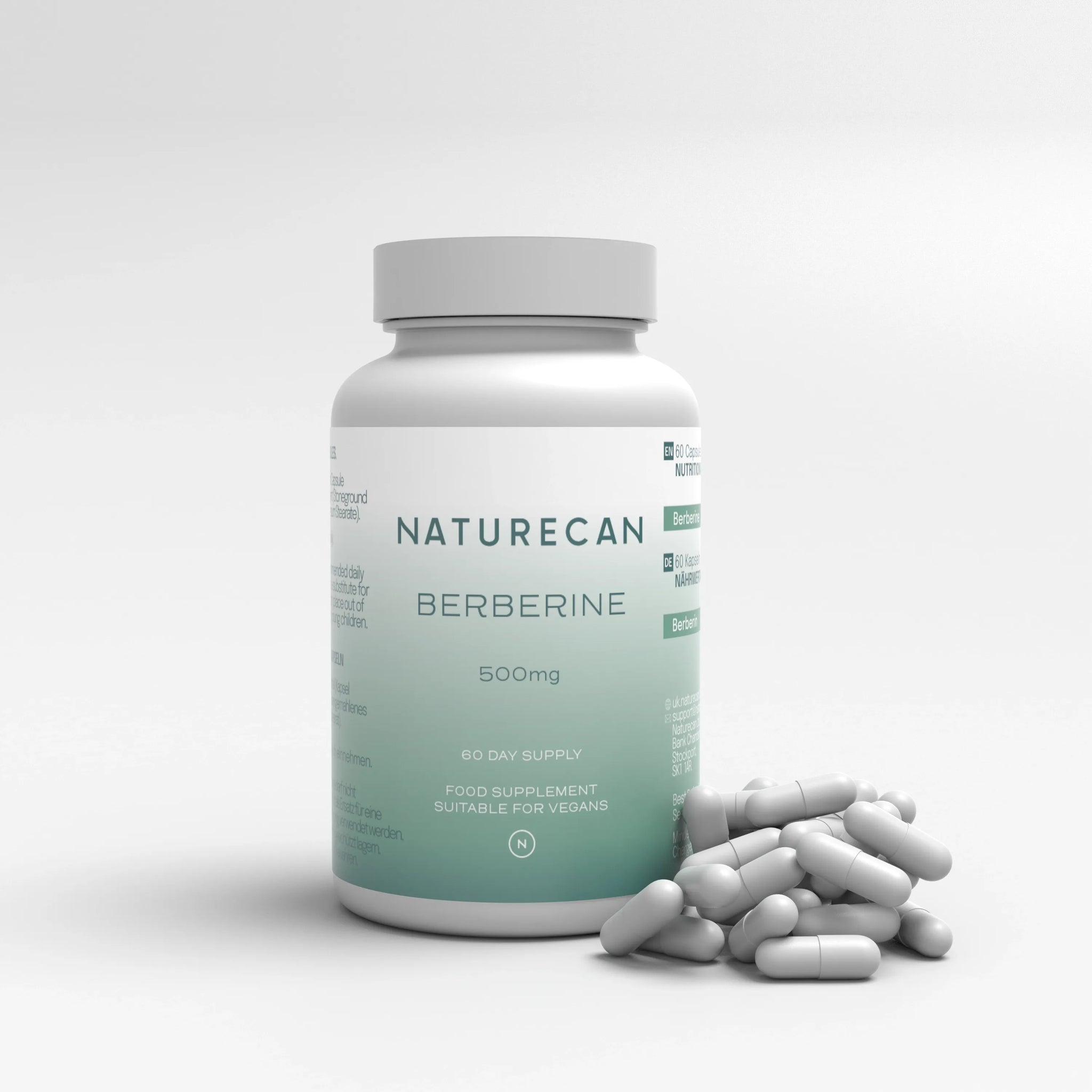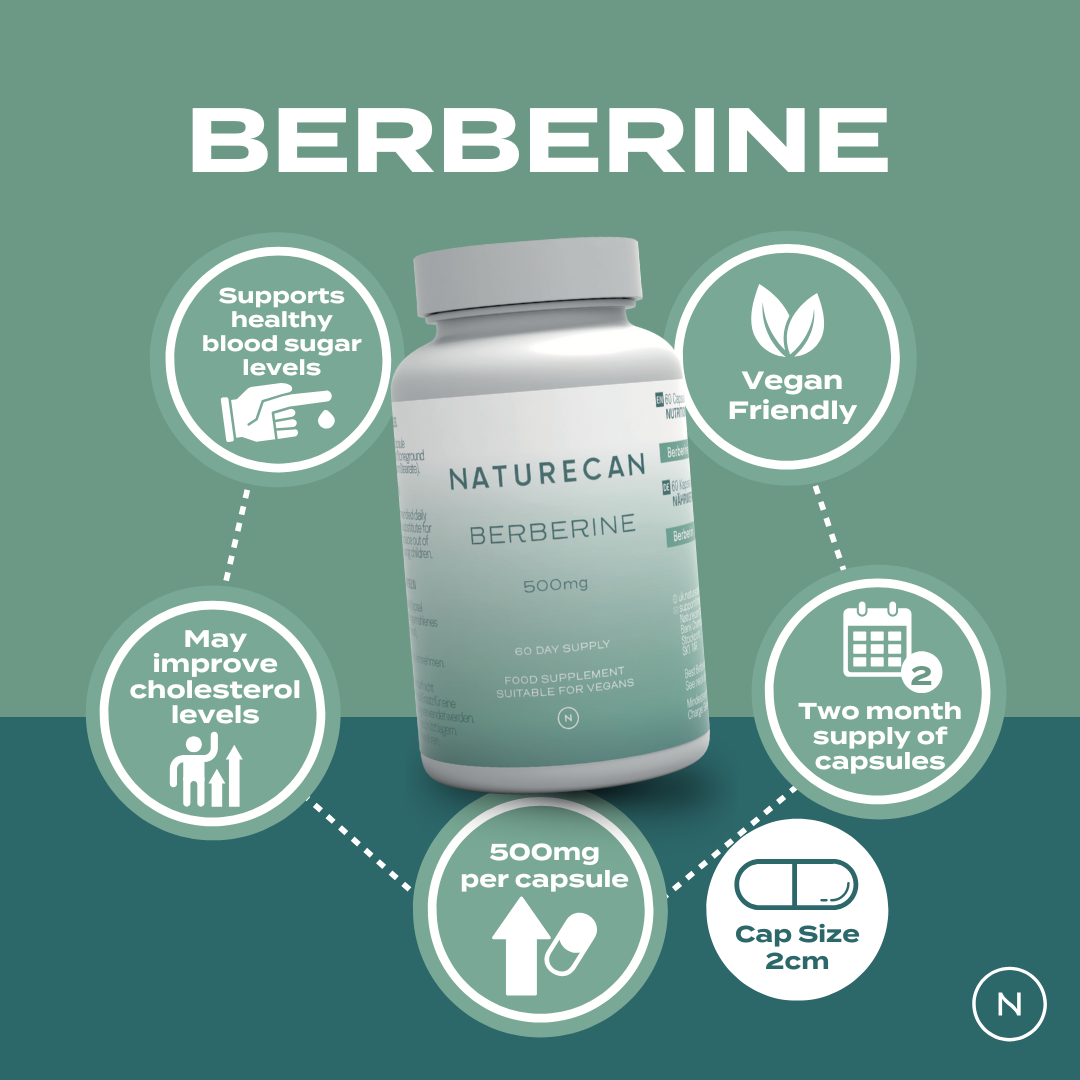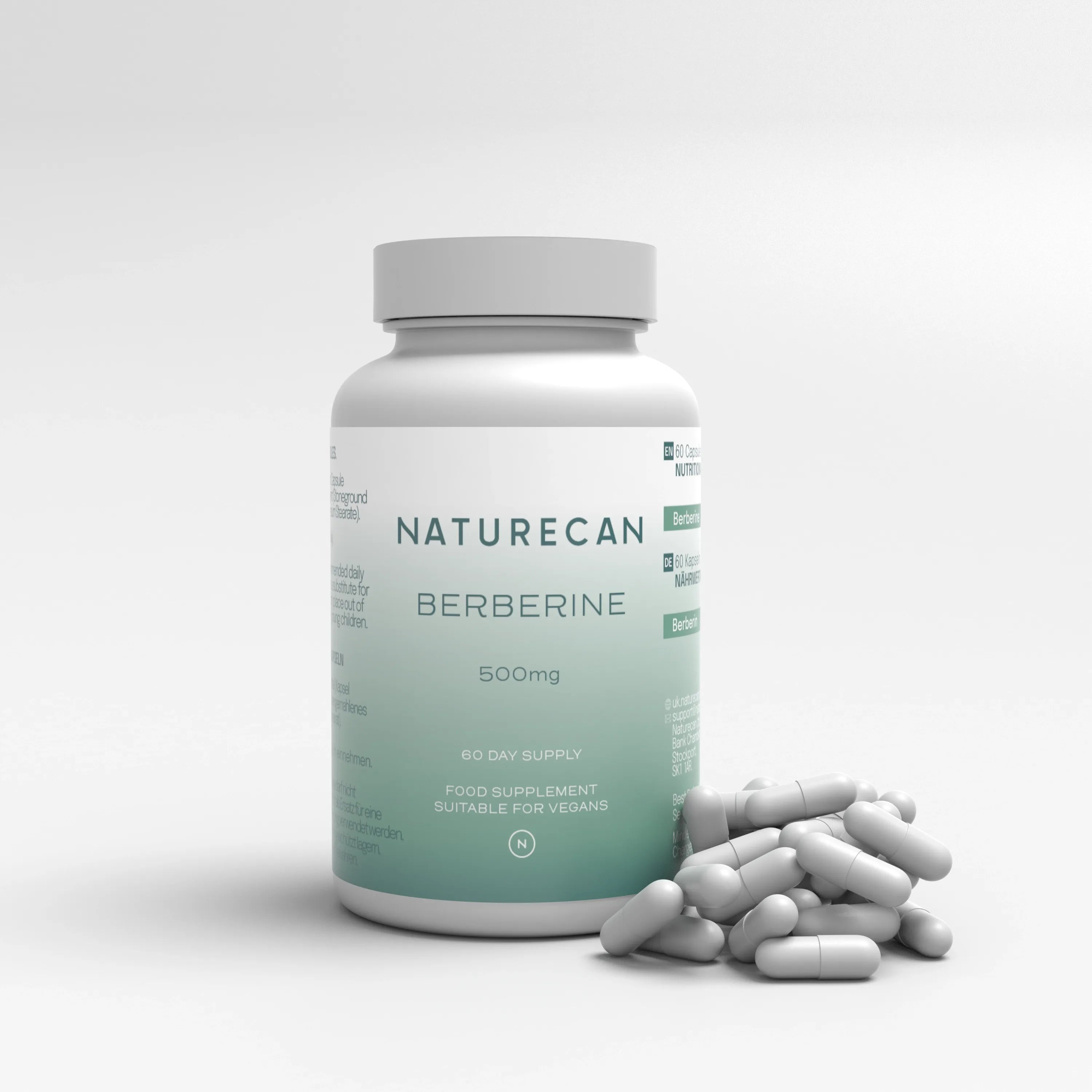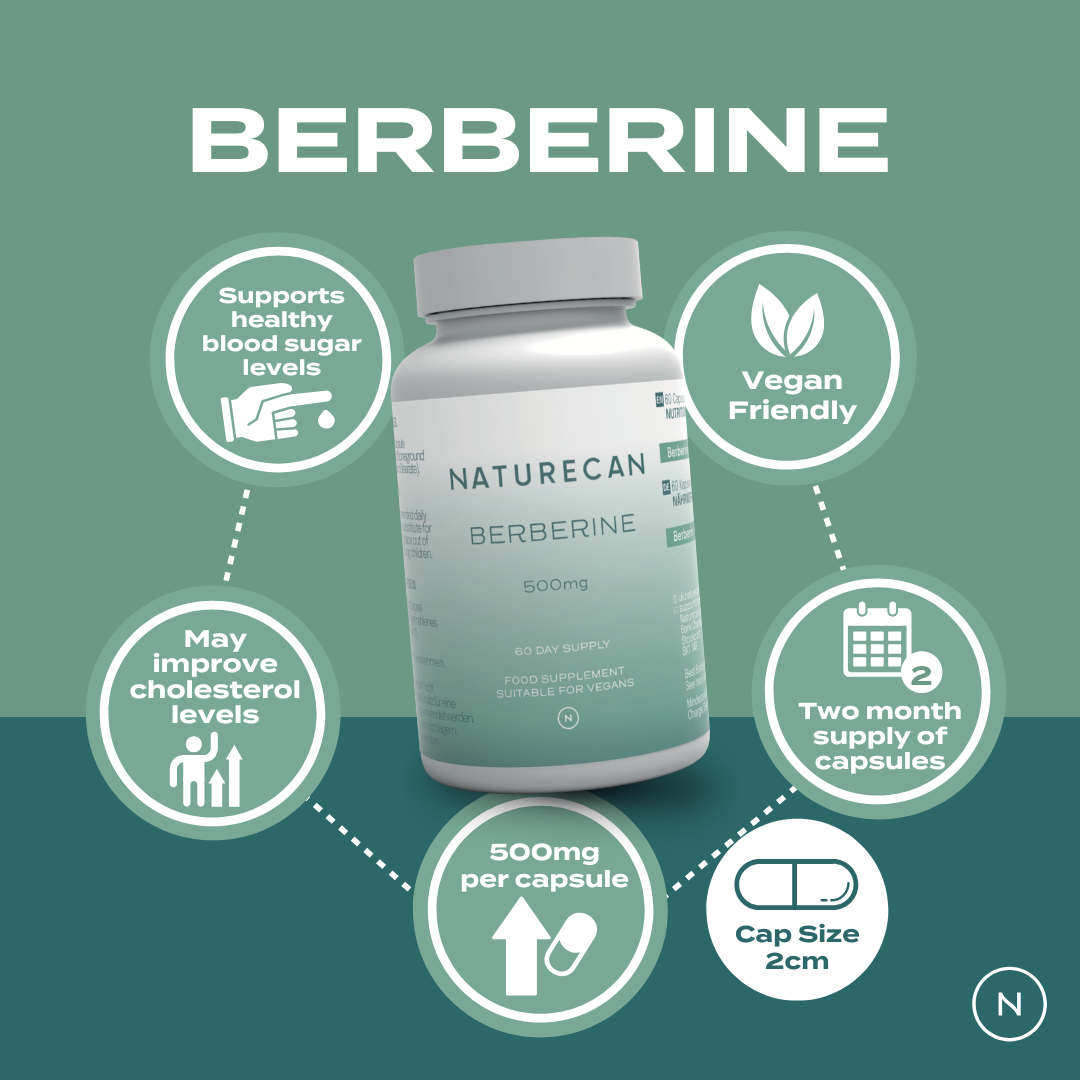What is berberine? Read more to find out the key benefits of berberine, and how to incorporate it into your daily wellness routine.
What Is Berberine? Benefits And When To Take It

Medically Reviewed By Dr Lilla Csonka: Dec 17, 2025
Written by Valeria Briancesco.
Agenda:
Berberine has gained significant attention for its potential health benefits. Derived from plants like barberry and goldenseal, this natural compound has been used for centuries in traditional medicine. But what is berberine, and what is berberine used for in modern wellness practices? Potential berberine benefits include support for blood sugar regulation, cardiovascular health, and gut microbiome balance.
However, understanding berberine side effects and proper usage is essential for maximising its advantages. As more people explore natural solutions for better health, berberine supplements continue to stand out for their versatility.
Key Highlights:
- Berberine is a plant-based compound derived from sources such as barberry and goldenseal, traditionally used in herbal medicine.
- Renowned for its potential benefits in blood sugar regulation, cardiovascular health, and gut microbiome balance, it has gained significant attention in modern wellness practices.
- Proper use and understanding of potential side effects are essential for maximising its benefits.
What is Berberine?
Berberine is a plant-based alkaloid extracted from various plants, including barberry, goldenseal, and tree turmeric. Known for its bright yellow color, Berberine has a long history of use in traditional medicine.
But what is berberine used for today? Its modern applications are backed by research highlighting several possible berberine benefits, such as its ability to activate AMP-activated protein kinase (AMPK), a key enzyme in regulating energy balance in the body [1, 2].
Understanding how to take berberine is also crucial for leveraging its full potential while minimising berberine side effects.
Potential Longevity Benefits: Research Suggests Anti-Ageing Effects Through Cellular Health Improvements
Berberine’s impact on cellular health and inflammation has led researchers to explore its potential anti-aging benefits. Key factors include:
- AMPK Activation and Cellular Repair: Berberine activates AMPK, an enzyme that plays a crucial role in cellular energy balance. This activation promotes cellular repair and maintenance processes essential for longevity while also enhancing the efficient use of glucose by cells, helping to reduce blood sugar levels.
- Reducing Oxidative Stress: Berberine’s antioxidant properties help combat free radicals, which cause DNA damage and accelerate aging.
- Supporting Mitochondrial Function: Healthy mitochondria are vital for energy production and aging. Berberine enhances mitochondrial efficiency and reduces dysfunction.
- Inflammation Reduction: Chronic low-grade inflammation is a hallmark of aging. Berberine may be able to support this inflammation, potentially delaying age-related diseases like Alzheimer’s or cardiovascular decline.

How Berberine Works in the Body
The Berberine supplement is most recognised for its ability to activate an enzyme called AMP-activated protein kinase (AMPK), often referred to as the "metabolic master switch [3]”. AMPK plays a critical role in regulating energy balance at the cellular level, influencing processes such as glucose uptake, fat burning, and inflammation control. But what is berberine used for in these contexts? Here’s how it benefits the body:
- Metabolic Regulation: Berberine improves insulin sensitivity and reduces glucose production in the liver, which helps balance blood sugar levels [4].
- Cardiovascular Impact: It lowers LDL cholesterol and triglycerides while raising HDL cholesterol, promoting better heart health, which is one of the well-known berberine benefits [5].
- Anti-Inflammatory Properties: Berberine reduces oxidative stress and potentially inflammation, which can improve cellular health and longevity [6].
- Gut Microbiome Support: With antimicrobial properties, berberine helps balance gut bacteria by reducing harmful microbes while promoting beneficial ones [7]. Understanding how to take berberine is key to maximizing its impact while minimizing potential berberine side effects.
6 Key Berberine Capsules Benefits:
- High-dose of 500mg Berberine per capsule to support glucose regulation.
- Improves insulin sensitivity for balanced blood sugar levels.
- Supports healthy metabolism, aiding in weight management.
- Promotes cardiovascular health by reducing bad cholesterol (LDL).
- Balances gut microbiota, encouraging better digestive health.
- Convenient and easy-to-swallow capsules for everyday use.

What is Berberine Used For? | 4 Benefits of Berberine
4 Key Reasons to Consider Berberine;
| Health Area | Potential Benefits |
|---|---|
| 1. Metabolic Health | May support blood sugar regulation and aid those with insulin resistance or metabolic syndrome. |
| 2. Cardiovascular Health | Potentially reduces cholesterol, improves lipid profiles, and promotes heart health. |
| 3. Weight Management | Helps regulate metabolism, reduces fat storage, and could support weight loss. |
| 4. Gut Health | Acts as an antimicrobial, may reduce gut inflammation, and supports a healthy microbiome, supports digestive function |
| 5. Longevity | May activate anti-ageing pathways, reduce oxidative stress, and support healthy ageing processes. |
Berberine Explained: Why is it Gaining Popularity?
Berberine’s multifaceted health benefits have earned it a spot among the most promising natural supplements. Here’s a deeper dive into its key benefits:
1. Blood Sugar Regulation: Balances Glucose Levels and Improves Insulin Sensitivity
One of the most researched benefits of berberine is its ability to potentially help regulate blood sugar levels, making it particularly valuable for individuals with type 2 diabetes or prediabetes. It works by:
- Improving Insulin Sensitivity: Berberine enhances how cells respond to insulin, reducing the amount of insulin needed to lower blood sugar.
- Reducing Glucose Production in the Liver: Berberine suppresses gluconeogenesis, a process where the liver produces excess glucose.

Clinical studies have compared berberine’s effectiveness to metformin, a commonly prescribed diabetes medication, with results showing comparable blood sugar-lowering effects without severe side effects. This makes it a potential natural alternative or complementary treatment for metabolic disorders. However, it is important to consult a healthcare professional before using berberine, especially if you are managing a medical condition or taking other medications.
2. Metabolic Health: May boost metabolism and possibly aid fat loss
Blood Sugar Regulation;
- May improve insulin sensitivity, helping cells use glucose more effectively.
- Reduces glucose production in the liver, supporting balanced blood sugar levels [8].
- Research suggests it may be as effective as some prescription medications, like metformin, in managing type 2 diabetes [9].
Weight Management;
- Boosts Metabolism: Enhances mitochondrial function, encouraging fat burning for energy.
- Suppresses Appetite: May reduce hunger and cravings, aiding in lower calorie intake.
- Clinical trials report modest weight loss and reductions in waist circumference over 12 weeks when paired with a healthy lifestyle.

Berberine offers a dual approach to metabolic health by managing blood sugar levels and potentially supporting weight management. Its effects make it a potentially valuable supplement for individuals with type 2 diabetes or metabolic syndrome.
Nevertheless, it is crucial to seek advice from a healthcare professional before starting berberine, especially for those with existing health conditions or on prescribed medications.
3. Heart Health: Lowers Bad Cholesterol and Promotes Vascular Health
Berberine supports cardiovascular health through its effects on cholesterol, triglycerides, and overall vascular function. Key mechanisms include:
- Lowering LDL (“Bad”) Cholesterol: Berberine increases the activity of LDL receptors in the liver, which helps clear excess cholesterol from the bloodstream.
- Raising HDL (“Good”) Cholesterol: It could promote higher levels of HDL cholesterol, which helps protect against cardiovascular disease.
- Improving Blood Lipid Profiles: Berberine reduces triglycerides and other harmful lipids that contribute to atherosclerosis.
These effects make berberine a powerful tool in preventing and managing heart disease, particularly for individuals with metabolic syndrome or type 2 diabetes. It is important, however, to consult a healthcare professional to ensure its suitability for your individual health needs.

4. Gut Health: Antimicrobial Properties Support a Balanced Gut Microbiome
Berberine for Gut Health;
- Balances Gut Bacteria: Targets harmful bacteria like E. coli and H. pylori while preserving beneficial microbes such as Lactobacillus [14].
- Reduces Gut Inflammation: May ease inflammation in the gut lining, potentially supporting conditions like IBS and IBD.
- Supports a Healthy Microbiome: Promotes a balanced microbiome, which may improve immune function and possibly reduce systemic inflammation.
- Enhances Systemic Benefits: Emerging research highlights its potential to support overall health through gut microbiome improvements.
- Apples: A common source of quercetin.
5. Berberine and Longevity: Exploring Cellular Health
- Supports Autophagy: May enhance the body’s ability to remove damaged cells and promote cellular regeneration.
- Inflammation Modulation: Potential to reduce chronic, low-grade inflammation associated with ageing.
- Cellular Resilience: May improve cellular health by maintaining balanced energy regulation and reducing oxidative damage.
- Anti-Ageing Potential: Early studies suggest berberine could influence key pathways involved in slowing age-related decline.
- Research in Progress: Ongoing studies aim to uncover berberine’s full impact on longevity and age-associated conditions.
Berberine’s potential antimicrobial and anti-inflammatory properties make it a valuable supplement for gut health. By balancing gut bacteria and possibly supporting inflammation, it fosters a thriving microbiome, crucial for digestive health and overall well-being. Proper usage enhances these benefits while minimising potential side effects.
Introducing Naturecan's Berberine Supplement
Naturecan’s Berberine supplement is crafted to help you explore the potential of this powerful compound for supporting your health. Made with high-quality ingredients and backed by Naturecan’s rigorous testing standards, it offers a convenient, reliable way to incorporate berberine into your wellness routine. Whether you’re seeking metabolic support, digestive balance, or enhanced overall vitality, Naturecan’s Berberine supplement may complement your lifestyle goals.
Key Potential Benefits of Naturecan’s Berberine Supplement;
- Hormonal Balance: May support insulin and leptin signaling for improved metabolic processes.
- Liver Health: Could aid detoxification and reduce fat accumulation in the liver.
- Vascular Support: Potentially promotes healthy blood vessels and circulation.
- Immune Modulation: May help balance immune responses and combat inflammation.
- Mental Well-being: Could assist in managing stress pathways for improved clarity and focus.
How to take Berberine?
Berberine is typically taken in capsule form, making it easy to incorporate into your daily routine. For best results, it is often recommended to take berberine with or shortly after meals to enhance absorption and minimize the risk of digestive discomfort. Always follow the dosage instructions provided on the packaging or as advised by a healthcare professional.
Can I take berberine with other supplements?
Berberine can often be combined with other supplements, as it targets different pathways in the body.
For example, pairing berberine with probiotics may enhance gut health, while combining it with omega-3 fatty acids or resveratrol could provide complementary benefits for cardiovascular and metabolic health.
Additionally, taking berberine alongside NMN (Nicotinamide Mononucleotide) may support cellular energy production and longevity by addressing multiple metabolic and cellular pathways.
However, it’s essential to consult with a healthcare professional before combining supplements to ensure safety and avoid potential interactions.
Are There Any Berberine Side Effects?
While berberine is generally safe, some users may experience mild side effects. These can often be mitigated by starting with a low dose and gradually increasing intake.
Common Side Effects Signs You Should Know
- Gastrointestinal discomfort, such as nausea, bloating, or constipation.
- Temporary fatigue or headaches.
Who Should Avoid Berberine?
- Pregnant or breastfeeding individuals.
- People taking medications for diabetes, cholesterol, or blood pressure without consulting a healthcare provider.
Recommended Dosage and Safe Use
- Typical dosage ranges between 500-1,500 mg per day, divided into 2-3 doses.
- Always consult with a healthcare professional for personalised guidance.

Summary
Berberine is a versatile supplement with numerous potential health benefits, including improved blood sugar regulation, cardiovascular health, weight management, and longevity.
While more research is needed to unlock its full potential, the existing evidence highlights its promise as a natural, science-backed solution for better health.
As always, consult with a healthcare professional before starting berberine, particularly if you are on medications or managing a chronic condition.

Dr Lilla Csonka
Medical Advisor at Naturecan
Dr Lilla Csonka is a medical doctor with primary interest in nutrition, sustainable and enjoyable weight
loss and preventive care. She worked as a medical doctor in psychiatry, so the emotional, mental
aspects of eating problems are also in scope with her clients.
She is working as a General Practitioner
resident doctor, so she has a clear understanding of the basic medical symptomology and disease care.
Dr. Csonka is eager to look through evidence based journals, articles to provide accurate, scientifically
backed medical data in the relevant scientific fields.


10 Best Longevity and Anti-Ageing Supplements
Discover the top 10 supplements to support your health and longevity!
Read Article
What Supplements Does Andrew Huberman Recommend?
Read now to learn the supplements that Prof. Huberman recommends!
Read Article
8 ways: how to boost your immune system
Want to enhance your immune system naturally, read our comprehensive guide!
Read Article








